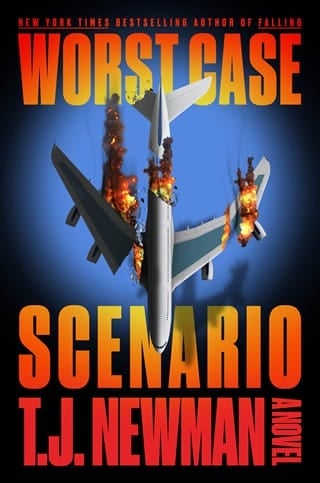Chapter Fifteen
CHAPTER FIFTEEN
COUNTDOWN TO ZERO HOUR 14 HOURS AND 06 MINUTES
AT THE PLANT , they’d survived problem one. Now they had to figure out how to survive problem two.
These idiots are going to get us killed, thought Renee, the shy and unassuming fluid-dynamics engineer sitting at the back of the control room, biting the inside of her cheek in frustration. She’d tried, many times, to say her piece but hadn’t been able to get a word in.
“We get a crane and lift—”
“Again, tell me where we’re getting this crane from? R1’s is permanently fixed. R3’s was damaged in—”
“Guys, ” Renee said, but still no one was listening to her.
“We use the fire truck’s ladder—”
“It’s not tall enough! Nothing is.”
Renee bit down hard enough that she could taste blood. “Damn it, listen !”
The whole room turned.
“It wouldn’t matter even if we did have a crane or a ladder that was tall enough,” she said. “The outward water flow is too strong. There’s nothing to push against it. We have to fix it from the inside.”
Her manager, Larry, the main reason she could never get a word in, scoffed. “I told you. That’s not happening.”
Before Renee could respond, the deafening bleat of the pool-water alert went off, making everyone flinch. Ethan shut it off with the side of his fist.
Every second they spent debating the problem, the water level was dropping. Every second they wasted bickering was a second closer to an uncontrollable fire they could never put out. Every second was one second closer to radiation in the air, the water, the soil. Every second was that much closer to the point of no return.
Ethan glared at Larry. “You’ve established what doesn’t work,” he said with an unsettling calm to his voice. “I need what does. If she’s got a solution, I want to hear it.” He turned to Renee. “Please. Continue.”
Renee cleared her throat. “We fix it from the inside.”
Larry, who looked like steam was about to come out of his ears, and half the people in the room shook their heads. The other half were dead serious.
“From inside the pool?” Ethan said. “You mean in the water?”
“Yes. We use what we have,” Renee said. “We use the fixed overhead gantry crane inside the pool building and position it over the biggest hole. We take a portion of the stainless-steel lining that was blown off and slip it down over the damage on the side of the pool.”
“Slide it down like a sluice gate?” Joss asked.
“Yes. Exactly. Like a sluice gate closing. The sheet will stay—”
“Unless,” interrupted one of the other Red Team engineers, “the damage to the building changes or there’s a disturbance in the water flow. It could slip out of position; it could go out the hole. It could make the damage worse.”
“Which is why,” Renee countered, “we would need to secure the sheet.”
“Secure it?” asked Ethan. “How?”
“We weld it into place.”
Silence.
“Underwater?” Ethan said, not understanding.
“Yes. The pool is concrete lined in stainless steel. So we have underwater welders weld a sheet of it to the pool’s own stainless-steel lining. Once they’re done, the outward water flow stops. Then we can reinforce it from the outside once we get the right equipment here. But in the meantime, the leak is sealed. And we can refill the pool. It’s a patch. A patch over a hole.”
Joss and Ethan shared a look. It was a long shot, but theoretically, it could work.
“Where do we get an underwater welder?” Ethan asked.
“That’s the problem,” said Dwight. “We talked to FEMA, who talked to the National Guard. Within our time frame, they said they can get us dive gear and divers. What they can’t get us is any underwater welding gear.”
“And the gear is—”
“Highly specific. Specific helmets, comms, tools designed for that and only that. They’re sourcing as we speak—”
“Won’t happen,” Joss said, cutting in. “We need this done in the next hour and a half, tops. It’ll be a month before putting a Navy diver in radioactive water for a risky, untested maneuver gets approved, to say nothing of getting them here with the gear to do it. Either we get someone local, or we do something else.”
“R.J. Brown.”
When the speaker crackled, everyone in the room turned.
“Ray Jay Brown,” said Carla from the line to the bunker. “We went to high school together. He used to do repairs on ships that ported on the Mississippi. Former Marine. Once he got out, he started a boat-repair company, but when Clover Hill announced it was decommissioning, business started moving downriver, and work dried up. His company went belly-up eventually. I heard he’s now a trucker. Heavy-duty towing or something. Although I think he was fired from that. He’s had some trouble with alcohol. But, look, he knows how to do it and he’s local.”
Any other day, even the thought of something like this being a viable alternative would have been ludicrous. But today, Ethan only said: “You got his number?”
“Phones are down,” Joss said.
“Right. You know where he lives?”
“I do. And I can drive.”
“That’s generous. But with all due respect,” said Joss, “I think we can handle it.”
“All due respect to you too, ma’am, but you show up at R.J.’s in a Clover Hill truck waving a badge, he’ll shoot you just ’cause.”
“Right. You drive,” Ethan said before Joss could argue.
Dwight held up a hand. “Am I the only one hesitating here? We’re really putting the entire fate of this planet into the hands of an alcoholic out-of-work trucker?”
Before anyone could speak, the low-water-level alarm rang again. The next threshold of caution had been reached. Ethan shut it off and said, “That’s exactly what we’re going to do.”
 Fullepub
Fullepub 



